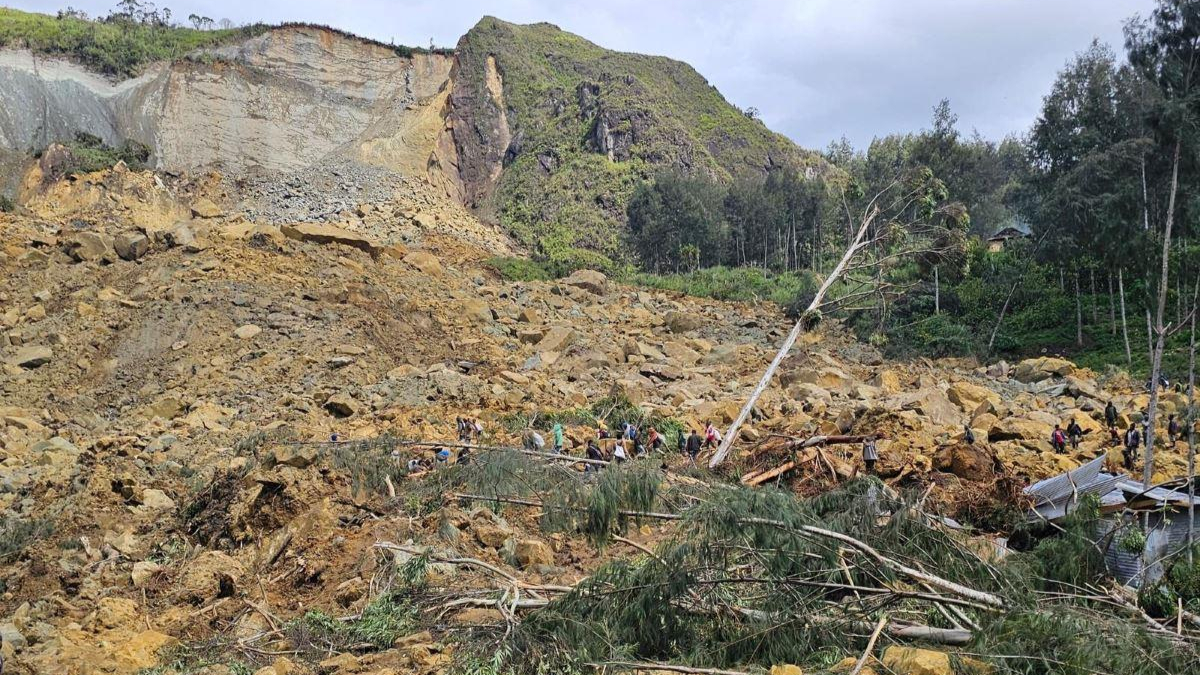A devastating landslide in Papua New Guinea has buried over 2,000 people alive near Yambali village in Enga province, according to the national disaster center on Monday. The treacherous terrain and difficulties in delivering aid are hampering rescue efforts, with fears mounting that few survivors will be found.
The initial estimates of those buried, provided by local authorities, have been increasing since the landslide occurred last Friday. Reuters reported that a United Nations agency had estimated the death toll at over 670 on Sunday. However, the National Disaster Center raised this figure to 2,000 in a letter to the UN, highlighting the extensive destruction caused to buildings and food gardens.
“The situation remains unstable as the landslip continues to shift slowly, posing ongoing danger to both the rescue teams and survivors alike,” the center stated in the letter.
Approximately 4,000 people were living near the affected area, said Justine McMahon, CARE International PNG’s country director, in an interview with ABC television. However, obtaining an accurate population estimate is challenging due to the lack of a recent credible census; the last one was conducted in 2000, with a new census planned for 2024.
Relief efforts are being hampered by the unstable terrain, remote location, and nearby tribal conflicts. Emergency crews, led by PNG defense personnel, are on the ground, but the first excavator only reached the site late Sunday, a UN official noted.
Footage posted on social media showed villagers and local media teams scaling rocks and digging with shovels, sticks, and bare hands to find survivors. Women’s cries could be heard in the background. So far, six bodies have been recovered. The UN stated that the death toll could change as rescue operations are expected to continue for several days.
Local NBC News reported that residents rescued a couple trapped under the rubble after hearing their cries for help. Johnson and Jacklyn Yandam expressed their gratitude, describing their survival as miraculous. “We thank God for saving our lives at that moment. We were certain that we were going to die but the big rocks didn’t crush us,” Jacklyn said. “It’s really hard to explain as we got trapped for nearly eight hours, then got rescued. We believe we were saved for a purpose.”
The landslide has displaced about 1,250 people, with over 150 houses buried and around 250 houses abandoned. McMahon of CARE stated, “The houses are buried under around eight meters (26.3 ft) of dirt. So there is quite a lot of debris to get through.”
The UN migration agency reported that water continued to flow under the debris, making it extremely hazardous for residents and rescue teams. Serhan Aktoprak, the chief of the UN migration agency’s mission in PNG, told ABC television that emergency crews would persist in their search for survivors until residents requested them to stop. He mentioned that the rescue team had eight vehicles but hoped for additional resources soon.
Tribal violence in the region has also raised security concerns for road travel, with military escorts for rescue team convoys. The UN agency reported that eight people were killed, and five shops and 30 houses burned down on Saturday due to ongoing tribal conflicts.
The landslide affected a section of the highway near the Porgera gold mine, operated by Barrick Gold through its joint venture with China’s Zijin Mining. Barrick stated that the mine has sufficient fuel to operate for 40 days and other critical supplies for a longer period.






